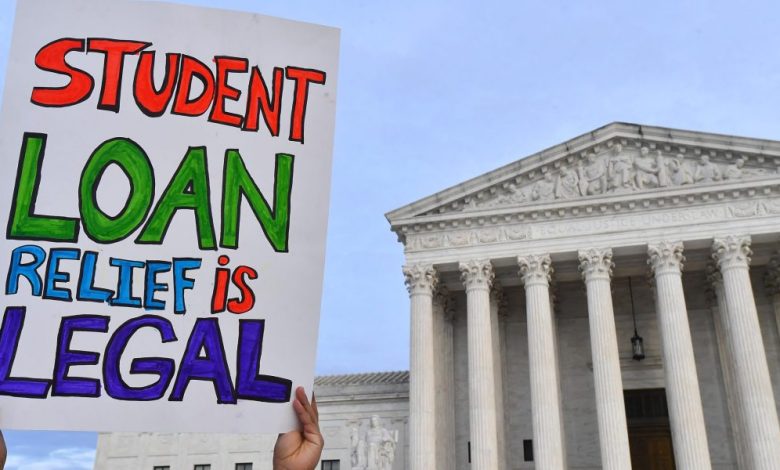States, local governments and scholars support student loan forgiveness

The pleadings have been submitted Nebraska vs. Biden and Ministry of Education v. Brownboth of which are under review by the Supreme Court to rule on the legality of the president’s plan to forgive up to $20,000 in student loans for federal borrowers earning less than $125,000 a year.
The Coalition of Pro-Forgiveness gives a number of reasons for their support and challenges the six conservative states mentioned Nebraska vs. Biden– Arkansas, Iowa, Kansas, Missouri, Nebraska and South Carolina – can even sue.
“This court should uphold the legality of Secretary of Education Miguel Cardona’s plan to provide critical assistance to student loan borrowers affected by an unprecedented pandemic,” a group of civil rights attorneys wrote in a brief. “The plan will have a significant impact on borrowers who are experiencing financial distress as a result of COVID-19.”
States that have filed an amicus brief in favor of the student loan forgiveness program include California, Colorado, Massachusetts, Michigan, Nevada, New York, North Carolina, Pennsylvania, Washington and others.
City and county governments supporting forgiveness stretch across the country, including Ann Arbor, Michigan; Atlanta; Cincinnati; Cleveland; Gary, Ind.; Houston; Jackson, Miss; Kansas City, Mo.; Little Rock, Ark.; Montgomery, Alabama; St Paul, Minnesota; San Francisco, California; Tucson, Ariz.; and Waterloo, Iowa, among others.
“Student debt relief will strengthen state and local economies and promote household financial stability and public health, thereby reducing reliance on state safety nets,” the governments write. “Among other things, the minister’s action will boost consumer spending and business development, encourage home ownership, close worrying labor shortages and stem the brain drain from rural areas.”
There’s even support from two conservative economists, Samuel Bray of Notre Dame Law School and William Baude of the University of Chicago Law School. While they believe the government’s forgiveness program is unlawful, they also believe the states suing to stop it have no claim.
“Even if the executive branch has exceeded its powers … that does not allow the judiciary to exceed its powers,” they write.
The case for forgiveness
The Supreme Court is dealing with two cases challenging the widespread student loan forgiveness plan. In Nebraska vs. Biden, states argue that their own finances would suffer and that the Biden administration does not have the authority to cancel debt on its own. Rather, they argue that Congress must approve the aid program.
In a separate case Ministry of Education v. BRown is suing two people on student loans who don’t qualify for the full amount of a potential loan forgiveness in an attempt to halt the entire program. Her case argues that the Biden administration failed to allow the appropriate public comment period required by law before the plan was introduced last year.
The essence of the Biden administration’s argument is that the Higher Education Relief Opportunities for Students Act, or HEROES, Act of 2003 gives the Secretary of Education sweeping powers in times of a national emergency (in this case, the COVID-19 pandemic). Many of the briefs filed by proponents support this argument, including one from former Rep. George Miller, who co-authored legislation for the HEROES Act and was Chair of the House Education and Labor Committee in the early 2000s.
They also argue that HEROES law allows them to implement the program without the normal comment period.
The lawyers, legal scholars and other petitioners say the HEROES Act gives Miguel Cardona, the current Secretary of Education, clear authority to make changes due to the national COVID-19 emergency. The law allows him to refer to regulations related to student finance programs, such as B. Refund Terms “to waive or amend them”.
“The HEROES Act expressly permits the Minister to use this power to ensure that recipients of federal student grants affected by national emergencies are not placed in a worse position than affected persons because of their financial support status,'” reads the by Miller filed brief.
The Biden administration argues that forgiveness is needed to prevent “extreme financial fallout” from the COVID-19 pandemic when the payment pause and interest accrual pause end. It also says inflation will exacerbate borrowers’ financial woes and some are at risk of default once the payment pause is over.
“No doubt the pause in student loan payments has eased the financial hardship of the pandemic for many borrowers. But at best it was a stopgap. Millions of borrowers will now re-enter repayment in a worse position than when they entered the pandemic,” writes a collection of more than 70 legal services and borrower advocacy organizations in a briefing. “All available data and borrowers’ experiences with the student loan system suggest that the return to repayment will result in a sharp increase in the number of borrowers who will suffer the harsh consequences of late payments and default.”
A recent report from the Urban Institute found that most borrowers aren’t necessarily in a worse financial position than they were before the pandemic — but the researchers note that this could be because they haven’t had to make federal student loan payments in almost 3 years. The researchers also note that defaults are likely to increase once payments resume.
Education secretaries under Biden and former President Donald Trump used the powers of the HEROES Act to halt payments and suspend interest accrual.
The oral hearings are scheduled for February 28, 2023. More than 26 million Americans have applied for the one-time student debt relief, according to the Biden administration.
Learn how to navigate and build trust in your organization with The Trust Factor, a weekly newsletter exploring what leaders need to succeed. Sign up here.



